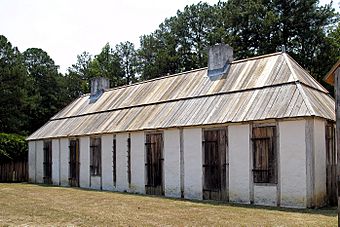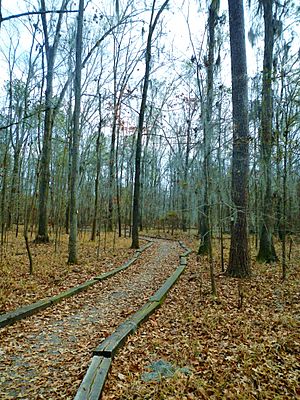Fort Jackson (Alabama) facts for kids
|
Fort Toulouse Site-Fort Jackson
|
|

A portion of the modern Fort Toulouse reconstruction, taken in 2007.
|
|
| Nearest city | Wetumpka, Alabama |
|---|---|
| Built | 1814 |
| NRHP reference No. | 66000148 |
Quick facts for kids Significant dates |
|
| Added to NRHP | October 15, 1966 |
| Designated NHL | October 9, 1960 |
Fort Toulouse and Fort Jackson are two important forts that stood on the same spot in Alabama. This special place is located where the Coosa River and the Tallapoosa River meet, close to the town of Wetumpka, Alabama.
Contents
The First Fort: Fort Toulouse
The first fort built here was called Fort Toulouse. The French constructed it in 1717. It was a simple stockade, which is a fence made of strong wooden posts.
Later, in 1735, the French built a stronger, better fort with the same name. They moved it a little further back from the river to protect it from erosion.
Fort Toulouse was a busy trading post. French traders met and traded goods with the Creek Indians here. This continued until the end of the French and Indian War in 1763.
When the French lost the war, they had to leave. Before they went, they broke their cannons so no one else could use them. The French soldiers then left for New Orleans or returned to France. The British, who won the war, chose not to use the fort, and it slowly fell apart.
Building Fort Jackson
Years later, during the War of 1812, a conflict broke out among the Creek Nation in 1813. This led to American soldiers from Tennessee, Georgia, and the Mississippi Territory entering the area.
This conflict became known as the Creek War (1813-1814). General Andrew Jackson led the American forces. His army included soldiers from Tennessee, U.S. regulars, and Native American allies from the Cherokee and Creek tribes.
General Jackson defeated a group of Creek warriors called the Red Sticks at the Battle of Horseshoe Bend in 1814. After this victory, he decided to build a new fort. He chose the same spot where the old French fort once stood.
This new fort was built near a sacred Creek site known as the Hickory Ground. General Jackson then left for a short time. While he was away, the fort was named "Jackson" in his honor.
When General Jackson returned, he made both his Creek enemies and his Creek allies sign the Treaty of Fort Jackson. This treaty took away about 20 million acres of land from all Creek people. This land was then opened up for white settlers.
A Special Historic Site
The site where both Fort Toulouse and Fort Jackson once stood is very important. In 1960, it was recognized as a National Historic Landmark. This means it's a place with great historical value to the United States.
In the mid-1970s, during the American Bicentennial (200th anniversary), people tried to rebuild Fort Toulouse. However, they accidentally built the replica on the outline of the much larger Fort Jackson. This meant it wasn't quite right.
Fort Toulouse-Fort Jackson State Historic Site
Today, this historic area is known as the Fort Toulouse-Fort Jackson State Historic Site. It's located near Wetumpka, Alabama.
Inside the site, you'll find the William Bartram Arboretum. An arboretum is like a park where many different kinds of trees and plants are grown for study and display.
In the 1980s, the Alabama Historical Commission took over the park. They carefully took apart the incorrectly built fort. The materials were then used to build a "correct" replica of Fort Toulouse. This new replica was placed next to the original site. This way, in the future, Fort Jackson can also be rebuilt on its exact original spot.
The Fort Toulouse-Fort Jackson State Historic Site offers exciting "Living History" programs. These programs bring the past to life! You can learn about the original Creek Indian people, the French soldiers who lived there, and the U.S. military from the War of 1812 era.
You can find the site southwest of Wetumpka, just off U.S. Highway 231 (Alabama).
 | Roy Wilkins |
 | John Lewis |
 | Linda Carol Brown |




